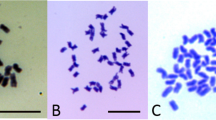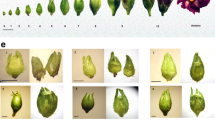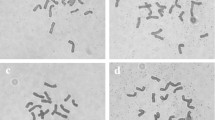Abstract
A POLYHAPLOID seedling with eighteen chromosomes has been found among the offspring of cytologically controlled tetraploid plants of sugar beet. The plant survived the winter months and developed a number of seed stalks in the following spring. At flowering time the plant was isolated in a greenhouse and, in addition, one branch was bagged. Despite the fact that the original diploid variety was classified as self-sterile, the new diploid (polyhaploid) plant set a number of seeds and proved to be partially fertile1.
This is a preview of subscription content, access via your institution
Access options
Subscribe to this journal
Receive 51 print issues and online access
$199.00 per year
only $3.90 per issue
Buy this article
- Purchase on Springer Link
- Instant access to full article PDF
Prices may be subject to local taxes which are calculated during checkout
Similar content being viewed by others
References
Savitsky, H., Proc. Amer. Soc. Sug. Beet Tech., 6, 198 (1950).
Fischer, H. E., Züchter, 26, 136 (1956).
Kruse, A., Yearbook, Royal Veterinary and Agricultural College, Copenhagen, 87 (1961).
Author information
Authors and Affiliations
Rights and permissions
About this article
Cite this article
ROMMEL, M. A Self-fertile Polyhaploid Plant in an Autotetraploid Variety of Sugar Beet. Nature 211, 648–649 (1966). https://doi.org/10.1038/211648a0
Issue Date:
DOI: https://doi.org/10.1038/211648a0
This article is cited by
-
Cytogenetics of autotetraploid sugar beets (Beta vulgaris L.)
Der Züchter (1966)
Comments
By submitting a comment you agree to abide by our Terms and Community Guidelines. If you find something abusive or that does not comply with our terms or guidelines please flag it as inappropriate.



